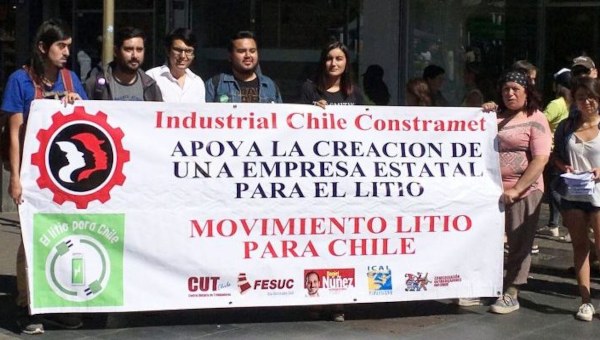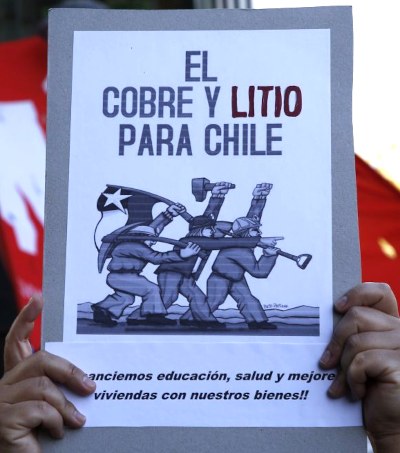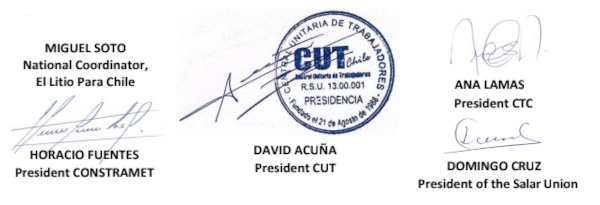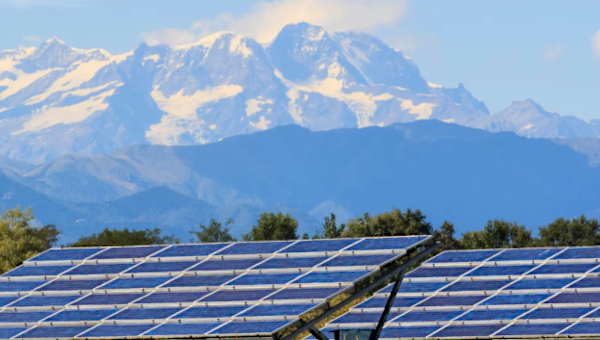Chile: Labour Movement Calls for Nationalizing Lithium Company
On April 20, Chilean President Gabriel Boric announced the launch of a National Lithium Strategy and the creation of a National Lithium Company. Under the new Strategy, the Chilean State’s role would undergo significant transformation – from a State which grants lavish, profitable contracts to oligopolistic private mining companies to a State which controls the entire production cycle, including exploration, exploitation, and value addition. The National Lithium Company will be a 100% state-owned company. It will develop lithium with private companies under public-private partnerships (PPPs), with the State securing majority shareholder status across projects.
This article pulls from a TUED briefing paper, the Battle for Lithium in Chile, which will be periodically updated on the TUED website as developments unfold. It provides a general historical context for the creation of the National Lithium Strategy and showcases TUED interviews with Chilean trade unionists on their responses to the National Lithium Company.

The National Lithium Strategy
In the televised announcement, President Boric highlighted five elements of the National Lithium Strategy and their respective objectives:
- The State will participate in the entire production cycle by creating a National Lithium Company. The Company will be 100% state-owned, according to the Interior Minister.
- Exploration, exploitation and value addition will be based on public-private partnerships. The state will control at least 50.01 per cent of shares in joint ventures with private investors.
- The administration will establish a network for the protection of salt flats, enacting the commitment to 30% of ecosystems protected by 2030. Chile will update to new lithium extraction technologies that minimise the impact on salt flats ecosystems. The research will focus on the protection and care of the salt flats.
- The State will guarantee the participation and involvement of the communities surrounding the mining sites. The first milestone in this process will begin with a direct conversation between the Council of Atacameño Peoples and Boric.
- The State will focus on the generation of lithium products with added value. Scientific and technological research and innovation will focus on a diversified and long-term development model. A Public Research and Technology Institute for Lithium and Salt Flats will be created for research and development to achieve a productive transformation with a more powerful, competitive and sustainable industry and which will open up new investment opportunities for lithium and other products.
Next Steps for the National Lithium Strategy
The Boric administration says it will present the final bill to create the National Lithium Company in the second half of 2023. In the meantime, all negotiations and preparations will start immediately. The State will be represented through the state-owned companies of Codelco (copper) and Enami (mining). “Codelco’s conversations with the companies that operate in the Salar de Atacama, particularly with SQM, which ends its contract in 2030, is something that will begin immediately during this semester,” said Nicolás Grau, Chile’s current Minister of Economy, Development, and Tourism. The government is aiming to reach an agreement before the end of Boric’s term in 2026.
Unions and the Movement Lithium For Chile
Movement Lithium For Chile (Movimiento Litio para Chile) is a national coalition of trade unions, academics, and social movements building towards a National Lithium Company and regional coordination of pro-public lithium policies with the governments of Chile, Bolivia, Mexico, Brazil, and Argentina.
A few weeks prior to the government’s announcement of the National Lithium Strategy, Chilean unions in the Movement Lithium for Chile published a declaration in support of the National Lithium Company, detailing their demands and vision, including the following points:
State control: Since lithium is a strategic mineral reserved for the state, it should be the state that takes control of it; to do so, it should carry out exploration and exploitation through a National Lithium Company. The state must always be the majority partner.
Public-Public: Codelco and/or Enami should take control of the salt flats in the immediate short term. This is necessary and possible, as the National Lithium Commission stated in its 2015 report.
Urgency: Currently, the state, through Corfo, holds leases in the Salar de Atacama with SQM and Albemarle (expiring in 2030 and 2043, respectively). What should be done immediately is for Corfo to lease its holdings to Codelco from 2030 onwards.
Labour-Community-Environment collaboration: All of the above must ensure the minimum environmental impact on the salt flats and with full respect for the communities, indigenous peoples, and the workers who will carry out the work.

The declaration was signed by the presidents of the main national centre CUT Chile, as well as the Confederation of Industrial and Service Metalworkers’ Confederation (Constramet, also known as Industrial Chile), Confederation of Copper Workers (CTC), Salar Union, and Miguel Soto as the national coordinator of the Movement Litio para Chile. Read the full declaration in Spanish and English.
Copper Workers’ Federation (FTC) rejects PPP
However, the Copper Workers’ Federation are unhappy about the proposed involvement of the private sector. In a March 2023 statement, the FTC’s National Board of Directors emphasized their demand for a National Lithium Company with a public mandate whilst emphatically rejecting the government’s announcement that the exploitation of lithium will be carried out in conjunction with private companies. Instead of a public-private partnership (PPP) approach, the FTC leadership insists on full public control and commercialization. The following fragment summarizes their position:
“We insist that the State can and must take charge of the exploitation and commercialisation of this strategic natural resource, exploiting its own properties and the deposits of this mineral which are currently owned by the State and which, erroneously, political, economic and ideological sectors insist on handing over its exploitation to the private sector and transnationals.
[…] Only through these public policies will it be possible to put an end to practices that have had a negative impact on the fair development and progress of Chile and that have only contributed to benefit the corporate ambition to continue with the private concession of lithium, a strategic resource for Chile and Chileans.” •
Public Statement on Lithium and the Salt Flats
In the last few days, a series of pronouncements have been made on the lithium and salt policy announced by the government. In view of this, the MOVIMIENTO EL LITIO PARA CHILE , made up of workers’ organisations, active and passive, public and private, student, social, political,
scientific and research organisations, we declare the following:
1) Lithium, according to the Constitution of the Republic, is a non-concessible mineral. Lithium
deposits are in the salt flats. These are fragile ecosystems that must be cared for, and where there
are communities and indigenous peoples.
2) Since lithium is a strategic mineral reserved for the state, it should be the state that should take control of it; to do so, it should carry out exploration and exploitation through a National Lithium Company, as President Boric expressed to the newspaper El País a few days ago.
3) As long as the National Lithium Company is created by law, it should be the state-owned companies Codelco and/or Enami that should take control of the salt flats right now. This is necessary and possible, as the National Lithium Commission stated in its 2015 report.
4) If public-private partnerships are necessary or desirable, they should be made through these state-owned companies (or subsidiaries of them), but always with the state as the majority partner.
5) Currently the state, through Corfo, holds leases in the Salar de Atacama with SQM and Albemarle
(expiring in 2030 and 2043 respectively). What should be done immediately is for Corfo to lease its
holdings to Codelco from 2030 onwards. In this way, this state-owned company, or a subsidiary of it, has enough time to take over these operations, and can seek private partners, always with the state as the majority partner. This subsidiary could even enter exploitation in the Salar de Atacama in 2024 via negotiation.
6) For the rest of the salt flats, any CEOL [special lithium operating contracts], if necessary, should only be handed over to subsidiaries of Codelco and/or Enami, who will carry out exploration and may seek private partners to participate, on a minority basis, in the exploitation of the mineral.
7) All of the above must be done while ensuring the minimum environmental impact on the salt flats
and with full respect for the communities, indigenous peoples, and the workers who will carry out the
work. •






